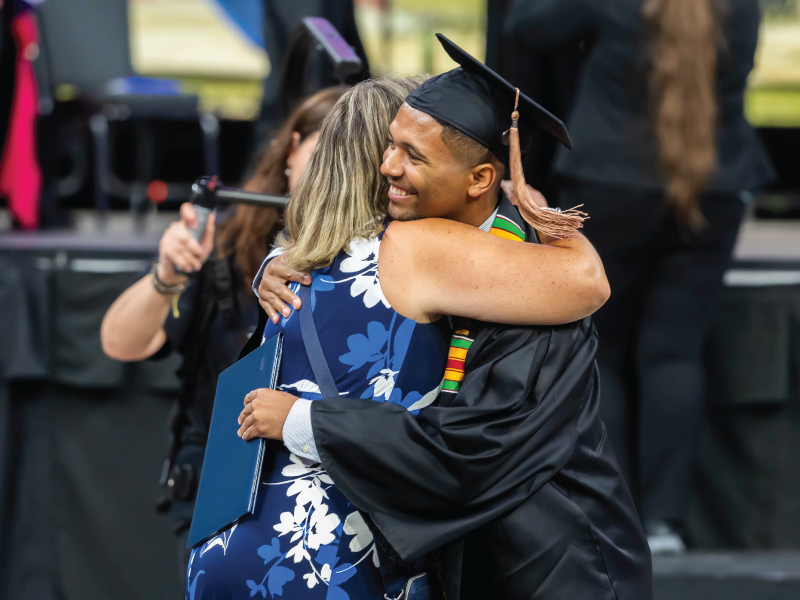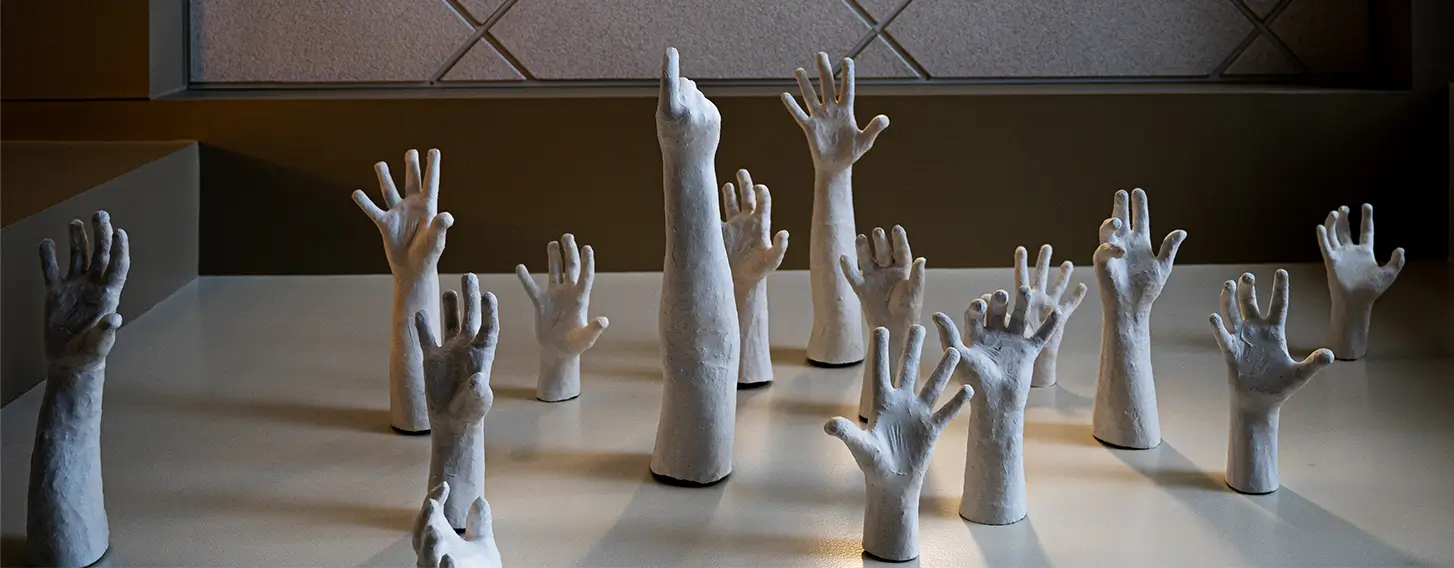Our Bachelor of Arts in Art History program fosters an energetic exploration of art, architecture, material culture, and museology through the study of primary visual and literary sources, with an emphasis on historical understanding, critical thinking, written and oral communication, and professional development. This is done through exploring a wide range of artistic movements, styles, and periods from ancient civilizations to contemporary art.
What is an Art History degree?
Reduce tuition by up to $24k
Why earn a BA in Art History?
St. Ambrose’s Art History program provides you with a foundation in art history. Our focus on career development makes sure you graduate with skills and work experience in your field. Our art history alumni have 100% placement in graduate schools, with most earning fellowship funding for their graduate degree.
Record-setting job placement rates
Students complete at least 130 hours of experiential learning, driving our job placement rate well above industry averages.
Option for Museum Studies minor
Add a minor in Museum Studies to prepare for roles like archivist, curator, or marketer in the fast-growing museum industry.
Experienced faculty
Our faculty are committed and charismatic, making each student’s career development their top priority.
Interdisciplinary approach
Deepen your degree with a second major, like History, Art, Psychology, Criminal Justice, Marketing, Education, or Graphic Design.
Industry connections
We partner with local museum professionals to provide supplemental instruction, giving our students a head start in their careers.
Accelerated master's degree
Earn two degrees in five years through our partnership with Western Illinois University’s MA in Museum Studies.
What you’ll learn in your Art History program
You’ll benefit from both traditional and non–traditional topics that explore the role of visual design in today’s world. Hands-on educational experiences throughout prepare you to hit the ground running after graduation.
- Strong understanding of history, art, architecture, material culture, and museology
- Resume-writing, interviewing, and networking with local museum professionals
- Specialized software for collections management in museums
- Best practices in exhibition planning, design, and installation, provenance research, and more
Explore Art History courses
- This degree will require you to complete a total of 120 credits.
- You will complete 39 gen ed credits, 36 Art History credits, 45 elective credits, and at least one internship.
Sample courses
| Class code | Class title | Credits |
|---|---|---|
| AH 121 | Mythic Image | 3 credits |
| AH/MUSE 205 | Art History & Museum Studies Careers | 3 credits |
| AH 343 | The Medieval World | 3 credits |
| AH 345 | The Renaissance | 3 credits |
| AH 353 | Russia | 3 credits |
How much does a BA in Art History cost?
The cost of your degree will depend on several factors, like scholarships, housing, meal plans, and transfer credits. New students also pay a $100 matriculation fee. You will also need to budget for books, supplies, materials, transportation, personal costs, loan fees, and other expenses. Explore the cost of attendance.
Full-time student living on campus
| Expense | By semester | By year |
|---|---|---|
| Full-time tuition (12-18 credits)* | $19,674 | $39,348 |
| Housing** | $4,313 | $8,625 |
| Food*** | $3,135 | $6,270 |
| Technology fee | $150 | $300 |
| Total direct charges (billable) | $27,272 | $54,543 |
*Based on 2026-2027 tuition and fees. Tuition and fees are subject to change each summer.
**This cost is estimated, actual housing cost will vary by student selections.
***Cost estimate based on 3 meals per day.
How much does campus housing cost?
When it comes to housing, St. Ambrose University offers diverse options to meet the needs of our students. From traditional dormitories to apartment-style living, there’s something for everyone. The cost of our housing will vary based on where you decide to live and the meal plan you choose.
St. Ambrose University is accredited by the Higher Learning Commission
Accreditation and recognitions provide the assurance we meet standards for quality of faculty, curriculum, learner services, and fiscal stability.
How does Art History faculty support their students?
St. Ambrose University’s Art History faculty channel their expertise into comprehensive courses exploring both traditional and non-traditional topics in art history. Students receive tailored guidance and industry connections from Fulbright-Hayes alum Terri Switzer, PhD. Faculty also oversee an active Museum Enthusiasts Club and the SAU chapter of the Kappa Pi Honor Society.
Art history program faculty
Other support resources

Student Success Center
At St. Ambrose, we want you to thrive. Access free tutoring, study groups, and supplemental instruction through our Student Success Center.

Accessibility Resource Center
Whether you need classroom accommodations, alternative exam arrangements, or disability support strategies, our Accessibility Resource Center is here to help.

Career services
Our Academic and Career Planning Center is ready to help you polish your resume and land the job or internship that will launch your career.
Are there scholarships available for BA in Art History?
At St. Ambrose University, we believe that education should be accessible to all. That's why we offer a variety of scholarships and financial aid options to help make college more affordable for our students. We are committed to providing our students with the resources they need to succeed academically and financially.
Ambrose Advantage scholarship
Through the Ambrose Advantage scholarship program, a tuition-free St. Ambrose University education is available to any Pell Grant-eligible Ioans. Learn more about the Ambrose Advantage.
Merit-based and institutional scholarships
St. Ambrose offers excellent scholarships and grants based on your strong academic performance, your talent in fine arts or athletics, or your community involvement. Explore SAU scholarships.
Transfer credits
At SAU, you may be able to transfer previous college credit toward your bachelor’s degree, saving you significant time and money. Learn how to transfer credits.
Don’t let cost hinder your future
"Cost is obviously a big thing for anybody going to college. When I found out about the Ambrose Advantage, it took the stress off me and my family. Now I can focus on my classes and getting a start on my career."
-Bailey Hird, Fairfield, Iowa
What’s on campus for Art History students?
St. Ambrose University’s Galvin Fine Arts Center is home to two galleries. The Catich Gallery hosts contemporary art exhibits featuring the work of regional and national artists as well as faculty and seniors graduating with honors. The Morrissey Gallery offers a unique exhibition opportunity to local and regional artists.
Art History students also have access to St. Ambrose’s Archives and Special Collections in the library. The archives preserve and make accessible significant documents and other materials. Special Collections includes artifacts, photographs, documents, yearbooks, catalogs, newspapers, and more. An SAU archivist also teaches an art history/museum studies class and provides support for other offerings within the department.
SAU’s very active Museum Enthusiasts Club is open to all students and arranges regular outings and social events, including an annual road trip to major museums. The club also helps coordinate the annual SAU Night at the Figge and an annual art auction. In addition, St. Ambrose hosts an active chapter of the Kappa Pi Honor Society.
Renowned galleries just steps away
“There is immense value in seeing what the day to day work of your field looks like. Without my internships, particularly my time at St. Ambrose’s Catich Gallery, I may not be where I am today.”
-Allison Boyer ‘22, BA in Art History and Painting
What are the admission requirements for a BA in Art History?
Ready to become a Bee? Here are the admissions requirements for our Art History program.
- You must have graduated from an accredited high school or earned a GED
- You must have a minimum cumulative, unweighted GPA of 2.5
- You must provide an official high school transcript
International student requirements
If you live outside of the U.S. there are different admissions requirements. Here’s what you’ll need:
- Official transcripts from secondary education
- A minimum 2.5 CGPA out of a 4.0 scale, or equivalent
- Proof of English language proficiency (minimum scores: TOEFL - 79, IELTS - 6.0)
- Copy of your passport and other documentation
What can I do with an Art History degree?
Your education and degree can help you reach your professional goals. St. Ambrose University can never promise a career or particular outcome upon graduating. We encourage you to explore potential jobs and employment settings. Here is a list of job titles, traits, and employment settings our Art History graduates explore:
Potential job titles
- Curator
- Museum educator
- Art gallery manager
- Fundraiser/grant writer
- Librarian
- Archivist
Potential employment settings
- Libraries
- Museums
- Historical sites
- Community organizations
- Religious and civic organizations
- State and federal government
Traits of an art historian
- Research skills
- Critical thinking
- Cultural awareness
- Interdisciplinary knowledge
- Attention to detail
- Communication skills
Industry facts
- The curator job market is stronger than ever. The job outlook percent is at 10%, a much higher percentage than average.
- The median wage for archivists, curators, and museum workers was $53,420 in May 2022.
For more information on financial employment and wages, visit the Bureau of Labor Statistics’ Occupational Outlook Handbook.
News and events at SAU
 >
>
February Discovery Day
Get a glimpse into life as a Fighting Bee during Spring Discovery Day
Read more

From the lab to the studio: Calvin Hertel finds his path through art at St. Ambrose
Calvin Hertel ‘25 didn’t enter college expecting to become an artist. What began as a biology major slowly transformed into something more personal.
Read more

“With a Prayerful Heart”: Fr. Eric Koami Kpotor finds purpose through music
When Fr. Eric stepped onto the stage, he was sharing music shaped by prayer, vocation & a lifetime of service.
Read more


Become who you are meant to be
With more than 50 undergraduate and graduate programs, there’s something for everyone at St. Ambrose University! Explore our programs to find your place at SAU.









